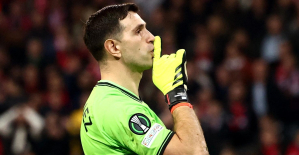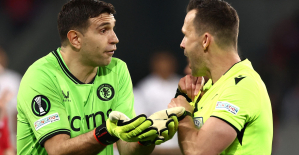The planned commemoration of the 50th anniversary of the Munich Olympic attack on September 5 is developing into a rare scandal in German-Israeli relations. The families of the eleven Israeli athletes who were murdered by Palestinian terrorists have finally canceled their participation in the major event in Munich.
In a letter to the Bavarian Prime Minister Markus Söder (CSU), which is available to WELT, they write: "50 years of abuse, lies, humiliation and rejection by the German government and in particular the Bavarian authorities are more than enough for us."
The federal government now fears that Israeli President Yitzchak Herzog will also turn down the invitation to Munich. Federal President Frank-Walter Steinmeier (SPD) is in close contact with his Israeli counterpart.
Ankie Spitzer, widow of the murdered Israeli fencing coach André Spitzer and spokeswoman for the relatives, told WELT: "The President has assured us that he will not go to Munich if we do not come." Jitzchak Herzog's office still told them on Thursday evening once confirmed: "Herzog sticks with the families and will not travel to the memorial service in Munich on September 5," his personal assistant assured them, according to Spitzer.
When asked, the spokesman for the Israeli President said that he did not want to comment on the process at this time. "It is important that the President does not go to Munich and thereby legitimizes this much too late commemoration," says Spitzer. The representative of the bereaved accuses the German government of wanting to calm the “national conscience” with the ceremony in Munich.
In a letter from the Ministry of the Interior to the victims' families dated August 11, which is available to WELT, it says that the federal government has decided to "now comprehensively process" the attack. In doing so, open questions should be answered, "possible gaps in the processing" should be closed and thus "the starting point of a new, lively culture of remembrance should be created".
For the eleven families who until recently were denied information about the death of their relatives and who had to fight for a long time to have a memorial and a minute's silence for the Olympic victims approved, that sounds like mockery, says Spitzer. Especially since their demand for fair financial compensation is still not being met.
The background to the dispute is a decades-long dispute between the victims' families and the German federal government over clarification and compensation. After the assassination in 1972, the German authorities denied the families access to files and more detailed information about the exact circumstances of their relatives' deaths.
The Interior Minister at the time, Hans-Dietrich Genscher, wanted to make her believe that there were no files on the attack, says Spitzer. She had to hear from former Munich police chief Manfred Schreiber that the Israelis had "brought terror onto German soil".
In recent years, the majority of the files have been unlocked one by one. According to historians, a series of mistakes made by the German security authorities meant that the attempted rescue of the hostages at the Fürstenfeldbruck airfield on September 6 ended in a shootout in which the nine Israeli hostages who had survived, a German police officer and five of the eight Arab kidnappers were killed.
Germany had rejected the Israeli government's offer at the time to send a special team to Munich to rescue the hostages. After that, the security forces and politicians involved tried to cover up their wrong decisions. To date, no German politician has taken responsibility for the failed hostage rescue and apologized to the bereaved.
Federal President Steinmeier now wanted to take over this on the 50th anniversary. The federal government also intends to comply with the relatives' request to have the events reviewed by a German-Israeli commission of historians. But in the dispute over financial compensation, there is no agreement. In addition, "trustful talks with representatives of the victims' families" were recently said by the responsible Ministry of the Interior.
In the letter of August 11, the federal government, the Free State of Bavaria and the city of Munich offer the families "further recognition benefits" of 5.4 million euros. A total of ten million euros is used as a guide, from which payments already made in the amount of 4.6 million euros would be deducted. A first payment in 1972 was made via the German Red Cross, apparently to avoid the impression of an admission of guilt.
They find the German government's offer to be an "insult," write the relatives in the justification for their refusal to participate in the planned commemoration. More than half of the money already paid had to be paid in years of legal disputes for lawyers and German courts.
It is the emotional resentment of the relatives over their long shabby treatment by the previous German governments that is becoming a problem for the current coalition, which wants to do significantly more. The argument that ten million euros in compensation corresponds to German standards; The Israeli families do not accept references to similar payments for the victims of the right-wing terrorist attack in Hanau or the Islamist terrorist attack on the Christmas market at the Berlin Memorial Church.
The German government is not directly to blame for these incidents, says Ankie Spitzer. Unlike in Munich, where the failure of the German security authorities contributed significantly to the deadly outcome of the hostage-taking. They expected compensation according to international standards, such as for the Lockerbie attack in 1988 or the attack on the West Berlin "La Belle" discotheque in 1986, in which several million US dollars in compensation were paid per victim.
For the 34 family members, it is not about the money itself, but about justice, stresses Spitzer. The German government even paid the three surviving Palestinian terrorists from Munich, who were freed by hijacking a plane at the end of 1972, more – nine million US dollars. And ultimately, the impression of the victims' families that Germany is not moving any further towards them than is absolutely necessary and is mainly interested in saving the Munich memorial service plays a decisive role in their rejection.

 Sydney: Assyrian bishop stabbed, conservative TikToker outspoken on Islam
Sydney: Assyrian bishop stabbed, conservative TikToker outspoken on Islam Torrential rains in Dubai: “The event is so intense that we cannot find analogues in our databases”
Torrential rains in Dubai: “The event is so intense that we cannot find analogues in our databases” Rishi Sunak wants a tobacco-free UK
Rishi Sunak wants a tobacco-free UK In Africa, the number of millionaires will boom over the next ten years
In Africa, the number of millionaires will boom over the next ten years WHO concerned about spread of H5N1 avian flu to new species, including humans
WHO concerned about spread of H5N1 avian flu to new species, including humans New generation mosquito nets prove much more effective against malaria
New generation mosquito nets prove much more effective against malaria Covid-19: everything you need to know about the new vaccination campaign which is starting
Covid-19: everything you need to know about the new vaccination campaign which is starting The best laptops of the moment boast artificial intelligence
The best laptops of the moment boast artificial intelligence Bitcoin halving: what will the planned reduction in emissions from the queen of cryptos change?
Bitcoin halving: what will the planned reduction in emissions from the queen of cryptos change? The Flink home shopping delivery platform will be liquidated in France
The Flink home shopping delivery platform will be liquidated in France Bercy threatens to veto the sale of Biogaran (Servier) to an Indian industrialist
Bercy threatens to veto the sale of Biogaran (Servier) to an Indian industrialist Switch or signaling breakdown, operating incident or catenaries... Do you speak the language of RATP and SNCF?
Switch or signaling breakdown, operating incident or catenaries... Do you speak the language of RATP and SNCF? The main facade of the old Copenhagen Stock Exchange collapsed, two days after the fire started
The main facade of the old Copenhagen Stock Exchange collapsed, two days after the fire started Alain Delon decorated by Ukraine for his support in the conflict against Russia
Alain Delon decorated by Ukraine for his support in the conflict against Russia Who’s Who launches the first edition of its literary prize
Who’s Who launches the first edition of its literary prize Sylvain Amic appointed to the Musée d’Orsay to replace Christophe Leribault
Sylvain Amic appointed to the Musée d’Orsay to replace Christophe Leribault Skoda Kodiaq 2024: a 'beast' plug-in hybrid SUV
Skoda Kodiaq 2024: a 'beast' plug-in hybrid SUV Tesla launches a new Model Y with 600 km of autonomy at a "more accessible price"
Tesla launches a new Model Y with 600 km of autonomy at a "more accessible price" The 10 best-selling cars in March 2024 in Spain: sales fall due to Easter
The 10 best-selling cars in March 2024 in Spain: sales fall due to Easter A private jet company buys more than 100 flying cars
A private jet company buys more than 100 flying cars This is how housing prices have changed in Spain in the last decade
This is how housing prices have changed in Spain in the last decade The home mortgage firm drops 10% in January and interest soars to 3.46%
The home mortgage firm drops 10% in January and interest soars to 3.46% The jewel of the Rocío de Nagüeles urbanization: a dream villa in Marbella
The jewel of the Rocío de Nagüeles urbanization: a dream villa in Marbella Rental prices grow by 7.3% in February: where does it go up and where does it go down?
Rental prices grow by 7.3% in February: where does it go up and where does it go down? With the promise of a “real burst of authority”, Gabriel Attal provokes the ire of the opposition
With the promise of a “real burst of authority”, Gabriel Attal provokes the ire of the opposition Europeans: the schedule of debates to follow between now and June 9
Europeans: the schedule of debates to follow between now and June 9 Europeans: “In France, there is a left and there is a right,” assures Bellamy
Europeans: “In France, there is a left and there is a right,” assures Bellamy During the night of the economy, the right points out the budgetary flaws of the macronie
During the night of the economy, the right points out the budgetary flaws of the macronie These French cities that will boycott the World Cup in Qatar
These French cities that will boycott the World Cup in Qatar Europa Conference League: the semi-final flies to Lille, which loses to the wire against Aston Villa
Europa Conference League: the semi-final flies to Lille, which loses to the wire against Aston Villa Lille-Aston Villa: Cash disgusts Lille, the arbitration too... The tops and the flops
Lille-Aston Villa: Cash disgusts Lille, the arbitration too... The tops and the flops Handball: Les Bleues in the same group as Spain at Euro 2024
Handball: Les Bleues in the same group as Spain at Euro 2024 Europa Conference League: for Létang, Martinez “does not have the attitude of a high-level athlete”
Europa Conference League: for Létang, Martinez “does not have the attitude of a high-level athlete”


















